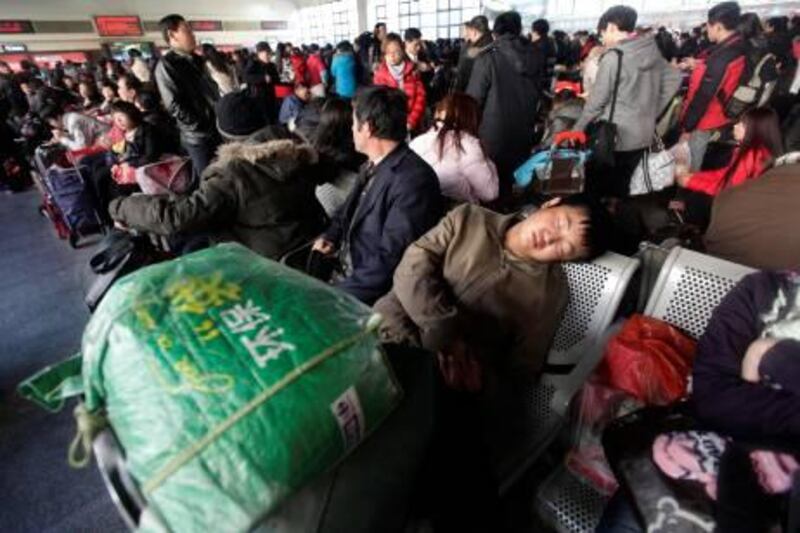BEIJING // The journey ahead for Li Xiaohua is not one for the faint-hearted. To reach home in time for the Chinese New Year, which is a week from today, Ms Li, 35, faces a 15-hour overnight "hard seat" train journey from Beijing to the ancient Chinese capital of Xi'an, then a further five hours by train to the town of Tianshui in her home province of Gansu.
As if that is not enough, an eight-hour bus trip to Maer, the village where Ms Li's family lives, is still to come. But after two years away and with the chance to see her seven and eight-year-old sons, she was excited to be starting the journey.
"I will eat very well and rest very well at home," she said while waiting at Beijing West Railway Station, once the largest railway station in Asia, among thousands of other migrant workers returning for the holidays.
"We do things the traditional way. We cook dumplings, invite friends and family. We have a good meal. We let off firecrackers and we'll watch the CCTV [China Central Television] new year gala show.
"It's the most important event for the family. I stay away from my sons so I can earn money to support them. Seeing them is the most exciting thing. I am so desperate to go home."
There are so many like Ms Li travelling for the Chinese New Year that the event is described as the largest annual human migration on earth.
China's ministry of transport says around 700 million people, more than half of China's population, will make 2.85 billion road, rail, air and ferry trips around the spring festival, as the holiday period is called. Even though extra services are laid on, many travellers have to queue overnight to secure a ticket.
Wong Siuyin, an expert on Chinese family life who teaches in the department of applied social studies at the City University of Hong Kong, says: "It's the most important festival and people use this time to meet relatives that maybe they never meet within the whole year.
"They can return to their home town for a long vacation because all the factories will close down for these weeks. They may take several days to get home."
With China firmly in the grip of the run-up to next week's festival, which follows the lunar calendar, stacks of red merchandise are for sale in shops, this colour being associated with the warding off of evil spirits linked to the new year.
There are red lanterns hanging from trees and attached to shop fronts, while inside stores, special sweets, red envelopes for giving money to children or unmarried adults, red clothes and red Chinese knots are prominently displayed.
The traditions of the new year have survived the development that has transformed China in recent decades. In the days before the new year, homes are thoroughly cleaned to get rid of bad luck, while on the evening itself families enjoy meals of dumplings and seafood, play board or card games and watch television, before letting off firecrackers, again to keep away evil spirits. The celebrations can continue for two weeks after the start of the new year.
Also for sale this year are cardboard pictures of cartoon rabbits to mark the year of the rabbit, which runs until January 22, 2012 and represents the fourth of the twelve animals included in the Chinese zodiac.
The year of the rabbit is seen as a quieter time after the year of the tiger which precedes it, and people born under the sign of the rabbit are said to have more luck than those who arrive during any of the other Chinese zodiac years. They are supposed to be calm individuals who avoid confrontation and do not crave attention.
Fun though the celebrations are, the cost of making the journey home to enjoy them can be significant, especially for the likes of Wang Ming, 32, who is paid between 1,400 yuan (Dh781) and 2,000 yuan a month to work on the construction of a new metro line in the capital. The 161-yuan ticket for a one-way hard seat train journey, and the 50 yuan spent on a subsequent bus trip, add up to at least two days' pay.
He said it was a small price, though, for a month off at home in Gansu province that will include several days of visiting friends for meals, along with shopping and the smoking of better-quality cigarettes than usual.
"I would be very upset if I couldn't go back," he said while waiting at the railway station with two friends from Gansu travelling back with him.
"I always want to go home at this time of year. It's the most important festival for Chinese people."
Zhang Jian, 40, is travelling alone, but like many other migrant workers, is laden down with gifts; he is taking an electric fan to his home in Chengdu, the capital of Sichuan province where he will see his wife and two daughters for the first time in two years.
"I have been in Beijing for 10 years, but I like my home town better. There's nowhere like your home town," he said as he steeled himself for a day-long train ride.






